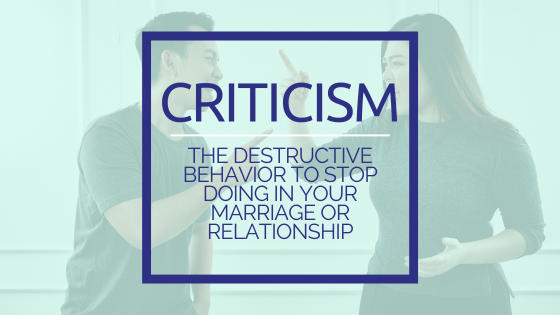Defensiveness
The first entry in our blog series, Four Behaviors in a Marriage that Predict Divorce: Gottman’s Four Horsemen, detailed The Four Horsemen of the Apocalypse, a concept noted in Dr. Gottman and Nan Silver's The Seven Principles of Making Marriage Work – these include criticism, contempt, defensiveness, and stonewalling. To gain a better understanding of these detrimental relational dynamics, this post will concentrate on defensiveness – a common issue that comes up in couples counseling.
What is defensiveness?
Defensiveness is a natural response when one feels attacked or criticized. This becomes problematic when this reaction becomes a default mode of communication. Instead of accepting responsibility and trying to understand the other person’s perspective, there is usually a counterattack or deflection of blame.
Scenario showing defensiveness
For the last several weeks, June and Marty had been trying to navigate a perpetual issue in their marriage, and they both had noticed that the other had become very defensive when the topic came up.
Most days, after a meal, June would notice that Marty would leave his dirty dishes in the sink. One day she said, “I've asked you so many times to wash your dishes after you eat. It's like you never listen to me or care about my feelings. I just don’t get it."
Marty, feeling attacked, responded with, "Well, I'm not the only one who leaves dishes lying around. You do it too. I'm not the only one with the issue here."
June felt unheard and really didn’t like that Marty was throwing the responsibility back on her, so she said, "Yes, I may occasionally leave a dish in the sink, but that's not the point. I'm talking about your habit of doing it all the time, every day. You’re avoiding the issue."
Marty continued to try to justify his behavior by saying, "Well, you're making it sound like I'm a slob or something. I don't see what the big deal is."
The conversation had quickly devolved into a back-and-forth exchange where they weren’t resolving the issue and each of them was becoming more frustrated and defensive.
What is the antidote to defensiveness?
Gottman's remedy for defensiveness involves taking responsibility for your part in the conflict, trying to listen to your partner's perspective, and acknowledging their feelings. If you respond like this, you can shift the conversation from a negative communication loop into a more constructive dialogue, increasing the chances of resolution.
How could this interaction have gone differently?
To address the situation more constructively, Marty could have responded differently, acknowledging June's concerns and taking responsibility for his actions. In response, June could have then expressed appreciation for Marty's willingness to acknowledge her concern and suggested they work together to find a solution to the problem.
The remedy for defensiveness in a marriage sounds simple, but it’s not so easy to actually put into practice. Couples counseling can help. A couples counselor can spot defensiveness, make you aware of the cycle you’re caught in, and help you move toward greater acceptance of responsibility and understanding in your relationship. Contact us to be matched with a couples counselor who uses the Gottman Method to get started!
Article by Lindsay Poth, MA, LMFT Associate
Offering Austin Couples Counseling + Gottman Method Couples Counseling






































































